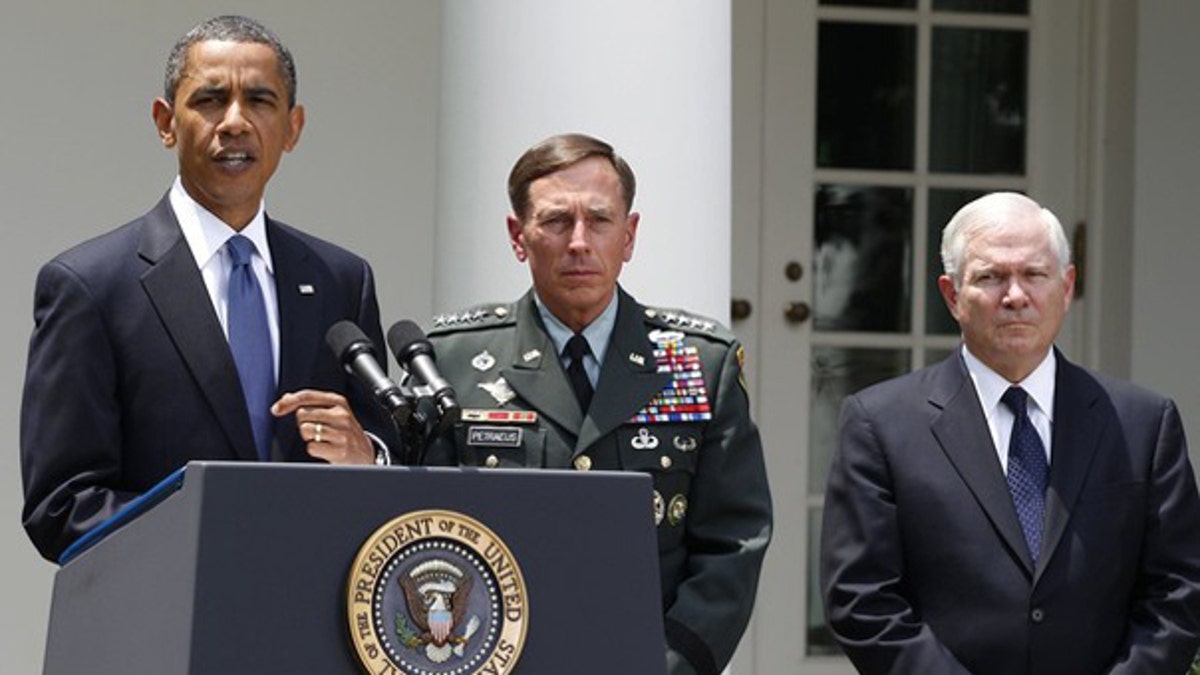
June 23: President Obama announces Gen. David Petraeus, center, will replace Gen. Stanley McChrystal in Afghanistan as Secretary of Defense Robert Gates listens. (Reuters)
President Obama won virtually unanimous praise for reshuffling his Afghanistan command in the name of unity on Wednesday -- but lawmakers and military analysts said they want to see the president heed his own no-tolerance policy and crack the whip on the civilian side when there's division in the ranks.
With Gen. Stanley McChrystal out, officials said the internal drama aired in the Rolling Stone article that was his downfall has hardly been resolved. McChrystal's diplomatic counterpart in Afghanistan is on record expressing doubts about the strategy thousands are fighting for, and lawmakers on both sides of the aisle said the president must get every member of his team on the same page.
In his Rose Garden remarks, the president signaled that's what he intends to do.
"I welcome debate among my team, but I won't tolerate division," Obama said.
Prove it, some said.
"There clearly isn't unity," said Pete Hegseth, an Iraq veteran and executive director of Vets for Freedom. "McChrystal aired some frustration that a lot of people have been having."
Though Vets for Freedom is frequently critical of the administration, Hegseth said Obama handled the McChrystal situation well. With Gen. David Petraeus named to replace McChrystal, Hegseth said he hopes the venerable commander will be a "powerful advocate" for Obama in building trust.
Some of the most searing and direct criticism in the Rolling Stone article was aimed at Ambassador Karl Eikenberry, who threw a wrench into the months-long strategy review process last year by raising critical questions about the troop buildup McChrystal was advocating and which was eventually adopted.
Sen. John McCain, R-Ariz., strongly suggested Wednesday that Eikenberry may present the next hurdle to mission unity in Afghanistan.
"We still have concerns about the civilian side," he said. "In fact, we might suggest that a consideration be given to reuniting the Crocker-Petraeus team."
Ryan Crocker was the top diplomat in Iraq while Petraeus was in command. The two were considered a dynamic team.
Sen. Joe Lieberman, I-Conn., echoed McCain's concern, though he did not suggest Crocker should be brought in.
"I think the unfortunate comments that appeared in the magazine article by General McChrystal and his staff reveal what we have known, which is that there is not the kind of unity in Afghanistan between our civilian and military leadership," Lieberman said. "I hope that we have turned a corner here and every member of the team -- civilian and military -- will now work with and behind the commander-in-chief in achieving the success that we need to achieve in Afghanistan."
Senators pledged to quickly confirm Petraeus, who would be leaving as head of Central Command, to the Afghanistan post. Though Obama stressed that the counterinsurgency strategy decided on last year would remain in place, senators expressed hope that Petraeus could provide the leadership needed to reverse the Taliban's momentum.
Several lawmakers said Obama will need to sustain his renewed push for unity to achieve that.
"It is now essential that President Obama finally take command and assert control over the civilian officials in his administration," Rep. Peter King, R-N.Y., said in a written statement.
Lt. Col. Tony Shaffer, an Army Reserve officer who served in Afghanistan from 2003 to 2004, said Obama is right to demand unity but that McChrystal's disagreements were not his alone.
"It takes two to tango," he said. "It takes two guys to not get along."
Shaffer, who now works with the Center for Advanced Defense Studies, said "deep distrust" remains and that Obama should apply his demands "to other elements of the government besides DoD."












































